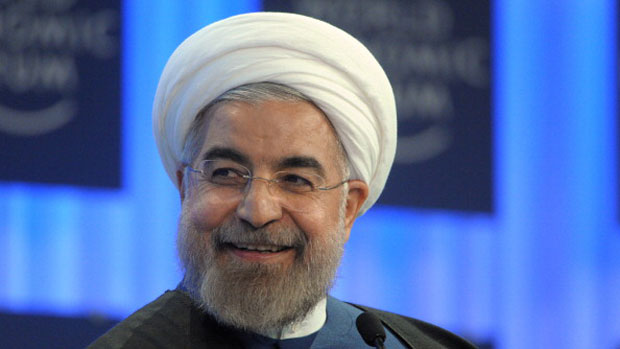Iran's Rouhani goes on 'charm offensive', but Israel left out
New president woos Davos delegates with call for 'constructive engagement' and economic partnerships

A free daily email with the biggest news stories of the day – and the best features from TheWeek.com
You are now subscribed
Your newsletter sign-up was successful
PRESIDENT ROUHANI'S conciliatory speech to the Davos World Economic Forum today constitutes Iran's "application to rejoin the international community", the New York Times says.
Rouhani told the forum that Iran was seeking "constructive engagement" with its neighbours, and insisted that it has no intention of acquiring nuclear weapons.
The NYT says the president's speech was carefully calibrated. It seemed to be designed to "pursue an effort to win broad international acceptance for a nation that under his predecessor, Mahmoud Ahmadinejad, was viewed by Western powers as dangerous, unpredictable and disruptive".
The Week
Escape your echo chamber. Get the facts behind the news, plus analysis from multiple perspectives.

Sign up for The Week's Free Newsletters
From our morning news briefing to a weekly Good News Newsletter, get the best of The Week delivered directly to your inbox.
From our morning news briefing to a weekly Good News Newsletter, get the best of The Week delivered directly to your inbox.
Rouhani described Iran's recent deal with the US and other nations to curb its nuclear programme in return for the lifting of sanctions as a "major development". Re-asserting his claim that Iran would not develop nuclear arms he said: "I strongly and clearly state that nuclear weapons have no place in our security strategy and Iran has no motivation to move in that direction."
Iran's new president also sounded a bullish note about his country's economic prospects. If sanctions are lifted and relations with the rest of the world "normalised", Iran has the potential to be one of the world's top 10 economies in the next three decades, the Financial Times reports.
The FT agrees that the speech was "upbeat and conciliatory". It notes that Rouhani said Iran intends to "reopen trade, industrial and economic relations with all of our neighbours" and identified Turkey, Iraq, Russia, Pakistan, Afghanistan as countries it wanted to do business with.
Rouhani also did his best to woo Western oil companies, saying a new investment model for oil contracts would be ready by September.
A free daily email with the biggest news stories of the day – and the best features from TheWeek.com
While Rouhani's speech appeared to be part of a "charm offensive", Iran's bitter enemy Israel was not among the countries being wooed. Israeli commentators noted that Rouhani said Iran wanted good relations with "all countries we officially recognise".
The remark was seen as a pointed acknowledgement that Iran will continue to be in a state of conflict with Israel, reports Jewish news agency, JTA.
Israeli President Shimon Peres criticised Rouhani's remarks saying the "most significant" comments were "the ones he didn't make". Rouhani failed to express support for peace in the Middle East and failed to say the time has come to make peace between Israel and the Arabs," Peres said.